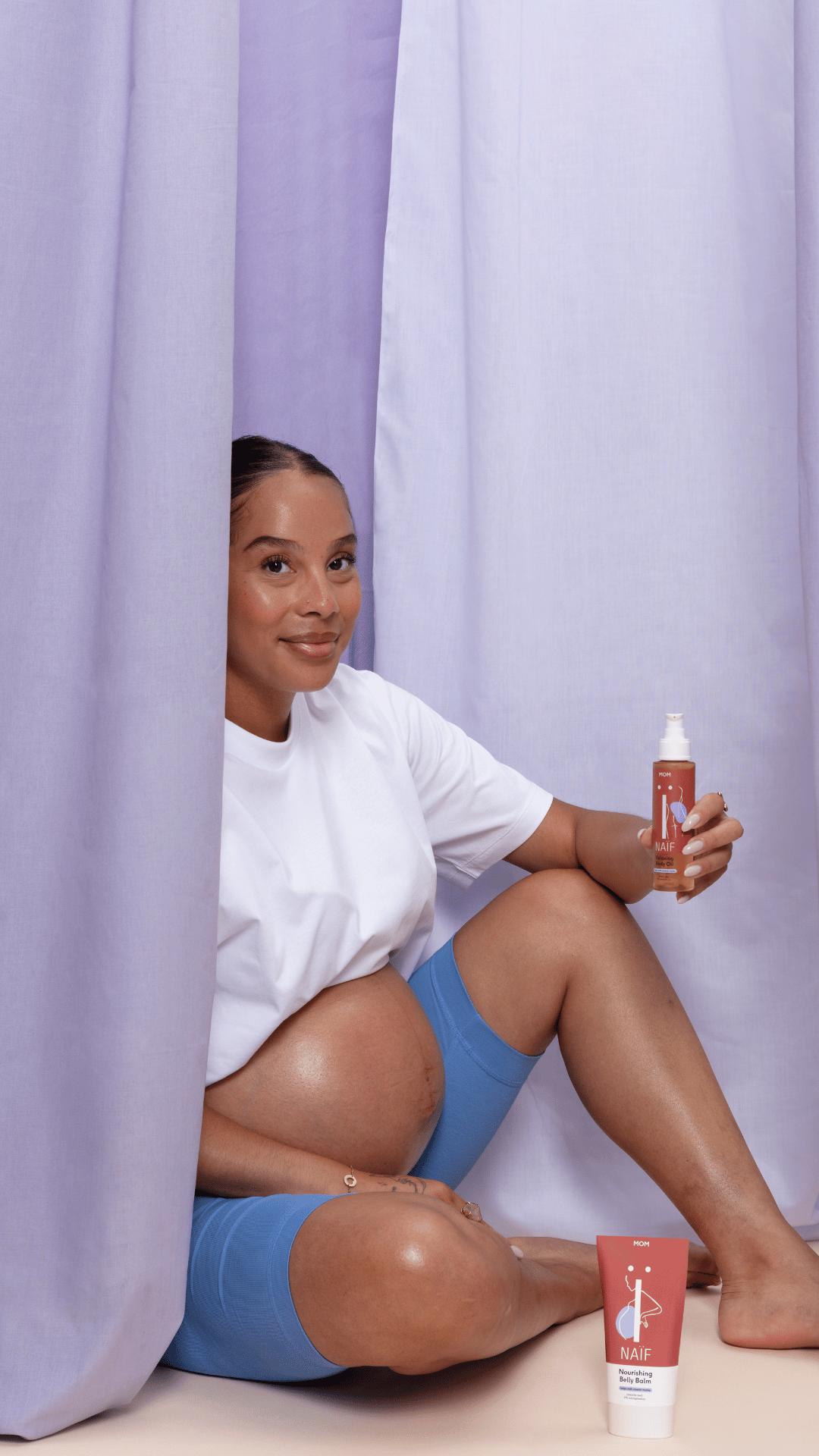Pregnancy
Safe skin care during pregnancy, do's and don'ts!
12 September 2023

Pregnancy is a beautiful time, but is also comes with a lot of questions. Because what do you all need to get ready? And what do you need to keep in mind? One of the questions you might have is what care products you can and cannot use during your pregnancy. Which ingredients are safe to use, but more importantly: which are not? We are here to help!
Creams, scrubs and oils. Most products are perfectly safe to use during pregnancy. But there are a few ingredients that you might want to limit or avoid. Below you can read all about these ingredients so you can decide for yourself whether you want to stay away from them or not. In doubt? We always advise to contact your general practitioner or midwife if you're not sure!
Parabens
You'll find parabens in lots of creams and shampoo's. They are often used as a conservative, so the product can be safely stored for a longer period of time. Conservatives are an essential ingredient in personal care products and help against mold and bacteria, but parabens specifically have gotten a bad reputation in recent years. Why? Both scientists and consumers are in discussion about the possible hormone disruptive qualities of parabens and their risks (for example: there is a possible link to breast cancer).
It's important to note that there is not enough information available right now to claim that parabens really are hormone disruptive. And also the link to breast cancer is never scientifically proven. The claim "free from parabens" can legally also not be used anymore, since it gives a negative view on the whole ingredient group to which parabens belong.
Do I need to avoid parabens?
For now it doesn't seem necessary to avoid parabens, but if you feel safer not using products with parabens there are more options out there. You can recognize parabens on the ingredient list with these names: methylparaben, propylparaben, butylparaben or benzylparaben.
Go for creams, shampoos and shower gels that are based on vegetable glycerin and with ingredients of natural origin. They nourish and nurture the skin, but without the possible risks.
Retinol (Vitamin A) and salicylic acid (BHA)
Cleansers, toners, serums and exfoliators often contain retinol (also known as vitamin A). It is advised to avoid this ingredient during pregnancy. Why? Because retinol can penetrate the skin quite deeply. The exact effect of vitamin A on an unborn baby is still a little unclear, but just as in your food it is better to stay away from too much vitamin A.
Salicylic acid is another ingredient to stay clear from while being pregnant. It's also known as BHA or beta-hydroxy-acid. It's an active ingredient with exfoliating properties which is often used with impurities and acne. The American College of Midwives and Gynecologists say that salicylic acid is safe to use in very low concentrations (2%), but not all over the face. That's why most dermatologists and doctors advise against using this ingredient during pregnancy. Better safe than sorry!
What to use instead?
Although some pregnant women are blessed with the famous pregnancy glow, this is definitely not the case for all of them (believe us, we know ;)). A lot of women even struggle with hormonal acne during pregnancy. To help with or prevent this issue it is important to cleanse your skin. Use a cleanser or face wash with mild ingredients of natural origin, like sunflower oil, which hydrates the skin.
Another ingredient that's often used with acne or blemishes is niacinamide, which slows down the production of tallow. Niacinamide is safe to use during pregnancy and can help you if you struggle with pregnancy related acne.
Vitamin C is getting more common in skincare, and for good reason! It can help clear your skin and make it shine. And guess what? It's completely safe to use during pregnancy. Let's get glowy.
Although it's best to avoid salicylic acid during your pregnancy, you can still exfoliate safely. Active ingredients like glycolic acid and lactic acid (AHA) are perfectly fine to use. Rather not exfoliate with active ingredients, but still want to remove dead skin cells? A mild scrub like ours (made with chalk from Dutch water) can help you out!
Foaming agents like SLES
SLES is the active ingredient which creates the foam in your shampoo, soap or laundry detergent. Products with SLES can have an irritating or tightening effect on the (sensitive skin). Note: not everyone will get a negative reaction from SLES, it depends on the skin and the person. But because of hormonal imbalances during pregnancy, your skin can already feel a little dryer and tighter than you're used to. Not the best combination, right? Although SLES is completely safe to use during pregnancy it might be wise to limit the use or avoid it altogether if you already struggle with dry skin.
What to use instead?
Not to toot our own horn, but all Naïf care products (like our Shampoo and Conditioner) are made with sodium coco-sulfate. It's an SLS variant but with ingredients derived from coconut oil. It makes our products nice and foamy, but mild for the skin too!
This also goes for a mild Day and Night Cream. Great to use during pregnancy, to give your face some extra love (and glow!). Look for ingredients like avocado oil that nourish and hydrate the skin.
Sunscreen
A lot of traditional sunscreen contains oxybenzone. This is a non-mineral UV filter which penetrates the skin and absorbs UV radiation. Although it protects you from sunburn and other harmful effects the sun can have on your skin, and normal use of oxybenzone is safe for babies, kids and adults, it can also lead to skin irritation, especially on the more sensitive skin. Additionally, oxybenzone is very harmful to the ocean, another reason to better avoid this ingredient.
What to use instead?
We believe that mineral sunscreen with a zinc oxide-based UV filter is the best choice for sensitive skin. Why? Because these filters do not penetrate the skin. Instead, they leave a protective layer on top of it. Think of it as a mirror which reflects UVA and UVB radiation. And zinc oxide the least harmful filter for the ocean as well, which makes it a double win!
Read more about UV filters and how they work here.
Disclaimer: This blog is not a replacement for medical advise from a (specialized) doctor. Always follow your doctors advise as they know you best.
Table of contents

Pregnant? We’re there for you!
There are a lot of changes during pregnancy. And that is pretty exciting! Those first 1.000 days are important for a baby. Let us help you with all your questions and worries. Sign up for our newsletter and be the first to know about.. well everything!